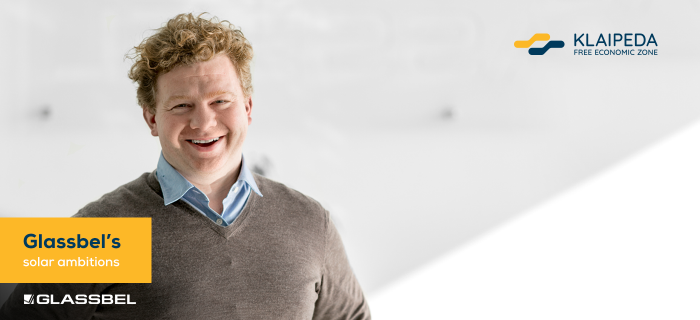News & Events
Watch our activity in one place
Glassbel Baltic Is Eyeing the Solar Panel Market

Glassbel Baltic, an architectural glass processing company, predicts that solar panel manufacturing will have a much bigger share of its total output in the future, even though the company has not been enthusiastic about this field as far as a couple of years ago. Their opinion is forcefully changed by the tightened EU regulations, aimed at battling climate change, the Verslo žinios business daily reports.
“Our sales are oriented towards the UK, Ireland, the US and Scandinavia. We can see increasing demand in the latter region because green energy attracts a lot of attention in Scandinavia. It is not that relevant to our clients in other regions, so only 1% of all our architectural glass sales included solar panels,” explains Valdas Virbalas, the Director and Member of the Board at Glassbel Baltic, which operates out of the Klaipeda FEZ.
On the other hand, the Director is sure that EU directives geared towards the energy efficiency of new buildings and a growing pressuring to take drastic action to battle global warming will increase the demand for solar panels.
Just a year and a half ago, V. Virbalas said to Verslo zinios that he doubts the possibility of the demand for solar panel-inclusive architectural glass growing. Investors calculated that the payback period for facades with solar panels is too long, so projects like this should remain limited.
Since then, solar panel prices dropped by around 30%. So, according to V. Virbalas, circumstances are changing, allowing for the possibility that demand for energy-generating architectural glass will grow.
“I do not reject the possibility that the manufacturing of solar panels will take up a bigger share of our total output. We are an innovative company, interested in products with higher added value,” V. Virbalas says.
According to him, there is no trend in Europe of glass processing companies taking up solar panel manufacturing. Instead, it is the solar panel manufacturers who are dipping into glass processing to widen the scope of their manufacturing efforts. This happens because the building developer normally wants to buy everything from the same place, it is more convenient. When it comes to mixing and matching solar panels and architectural glass from different manufacturers, problems almost inevitably come up.
The ability to meet the demand for both architectural glass and solar panels gives Glassbel Baltic a competitive advantage.
Last year, the company made the decision to reorganize their business model, dropping products with low added value and clients that did not pay in time. This reason, together with the reconstruction of their tempering furnace, which took almost two months, causing the company to stop production, influenced the financial results of the company. Turnover dropped by 17%, to 18.9 million EUR. On the other hand, this temporary setback will allow the company to reach better numbers in 2019.
“Even though there will be no huge turnover growth spurt, the fact that we are working on complicated projects will allow us to make a better profit than we did last year,” the Director explains.
Looking at how Brexit turns out
The budget for 2020, which is being discussed by the Glassbel Baltic shareholders, will depend on the outcome of Brexit in a major way. The United Kingdom is one of the biggest export destinations for the company. V. Virbalas does not believe that building projects will freeze in the UK next year, too many of them have been started. The situation in 2021 and 2022, on the other hand, is much more concerning.
“At the moment, many projects with prepared and approved architectural plans and necessary permits are frozen. Many projects are waiting for the outcome of Brexit, anxious to see the reaction from the financial markets which are responsible for project financing. The future trends will depend on whether Brexit will cause a recession or not. I am speaking about 2021 and 2022 because we start working on an object after a year or more when the building’s frame is already built,” the leader of Glassbel Baltic explains.
The 2020 budget for the company is geared towards employee training. The Director emphasizes that the biggest challenge the company has to deal with is HR-related, the company feels a shortage of qualified specialists.
“Emigration is still a big problem in the country. Aside from that, I have noticed a trend of people losing their loyalty towards a company, it is becoming difficult to keep an employee working for you. The same thing happened just before the previous economic crisis,” V. Virbalas bemoans.
Glassbel Baltic employs 181 people with an average salary exceeding 2,000 EUR/month.
